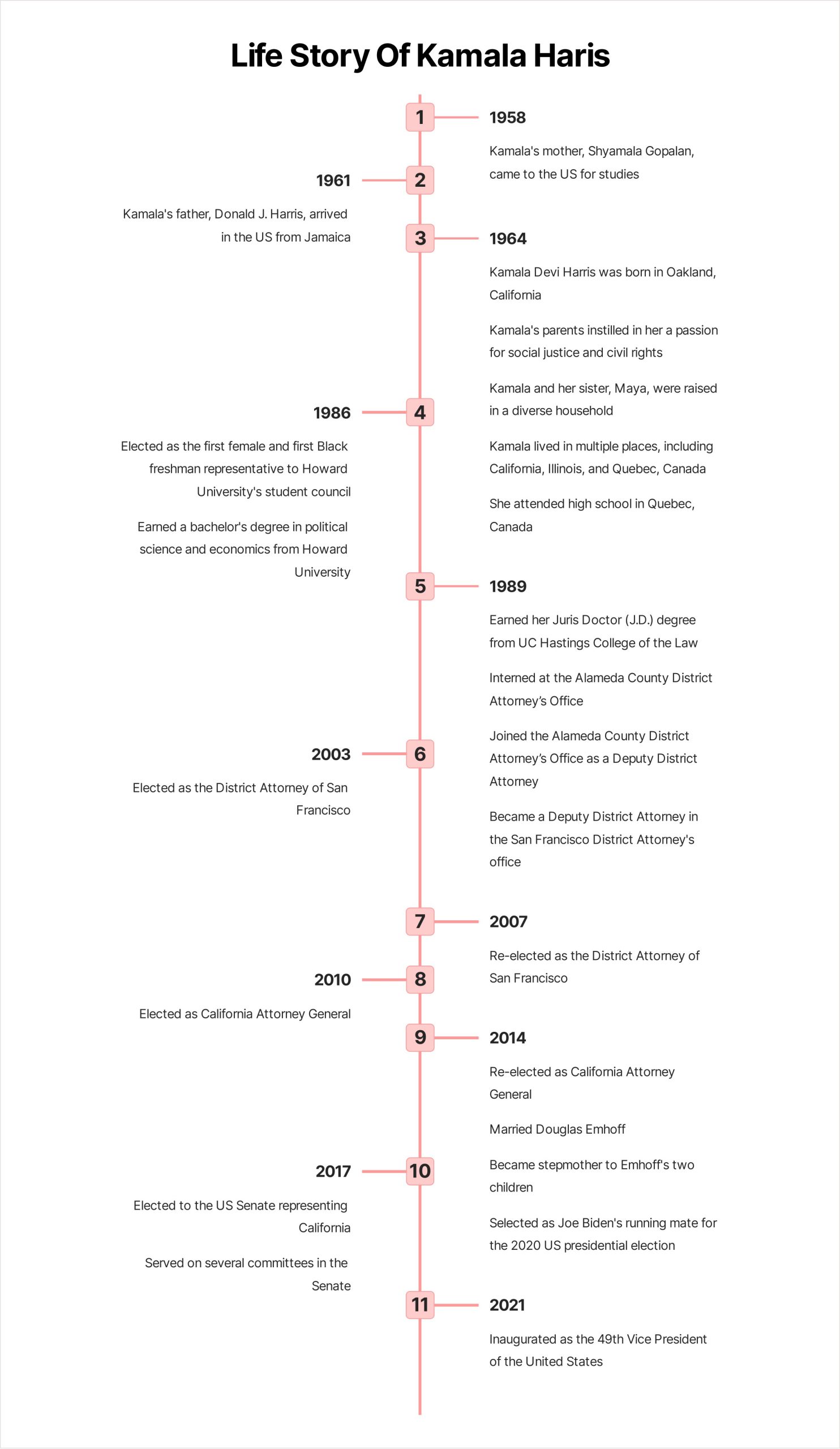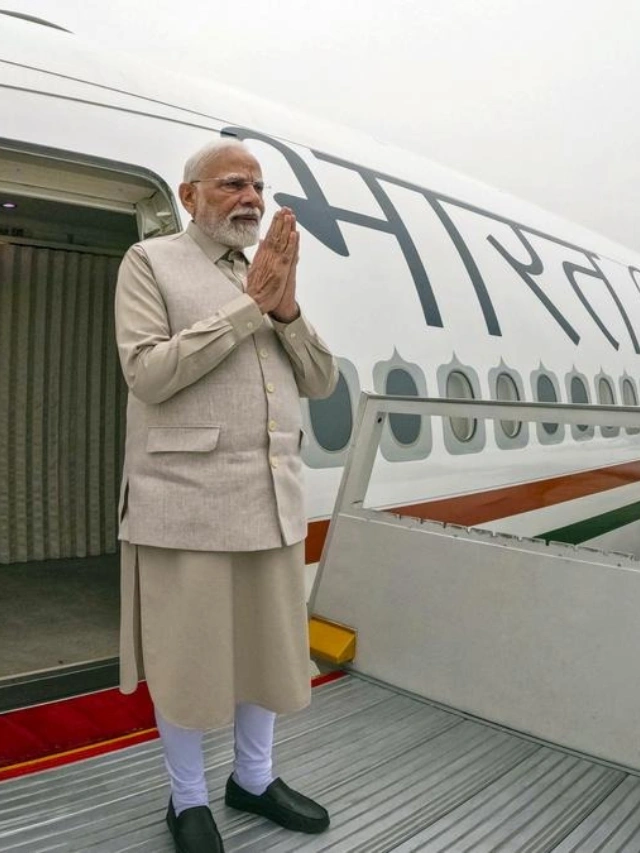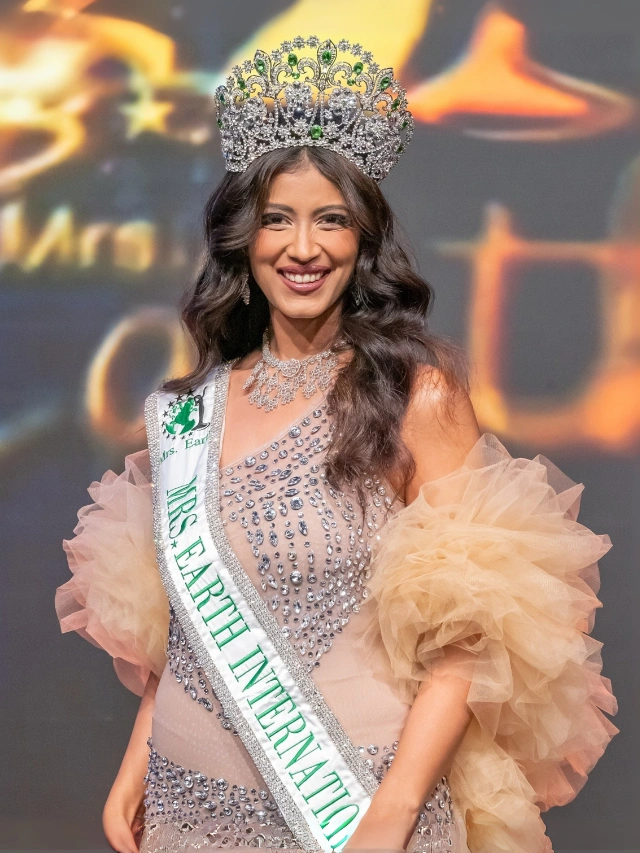Kamala Harris
Kamala Harris made history as the first woman, first Black American, and first Asian American to become Vice President of the United States. She served as the junior U.S. Senator from California from 2017 to 2021 after winning the 2016 Senate election. Her political trip started when she won California’s Attorney General position in 2010. She became the first woman, first African American, and first South Asian American to hold this position in the state’s history.
Harris’s vice presidency has shown remarkable influence through her 33 tie-breaking votes—more than any other vice president in American history. These significant votes helped pass the American Rescue Plan Act of 2021 and the Inflation Reduction Act.
CEO’s | Actors | Politicians | Sports Stars
She also set fundraising records in 2024 by raising an unprecedented $671 million (£514m) in donations over just two months. This amount was nearly triple what her Republican opponent Donald Trump raised. Harris’s multicultural roots and her historic rise to the White House mark achievements that have altered the map of American politics forever.

Early Life and Education
Kamala Harris parents and multicultural roots
Birth and Heritage: Kamala Devi Harris was born on October 20, 1964, in Oakland, California. She grew up in a rich multicultural family. Her mother Shyamala Gopalan, a breast cancer scientist, came from India in 1958. Her father Donald J. Harris, an economist from Jamaica, arrived in the United States in 1961. They met at the University of California, Berkeley in 1962 during civil rights activities and married in 1963.
Family Background: Shyamala Gopalan was born in December 1938 in Madras (now Chennai), India. She came from a Tamil Brahmin family. Her father, P.V. Gopalan, worked as a senior civil servant, and her mother, Rajam, fought for women’s rights. Donald Harris was born in August 1938 in Saint Ann’s Bay, Jamaica. He earned his Bachelor of Arts from the University College of the West Indies in 1960 and completed his PhD from UC Berkeley in 1966.
Parental Influence: The civil rights movement of the 1960s shaped Harris’s early years. Her parents took their young daughters to protests. She often says she had a “stroller-eye view of the Civil Rights movement”. Her mother played a crucial role in shaping her identity. She raised her daughters as “confident, proud Black women” while keeping their Indian heritage alive through visits to India.
Childhood in California and Canada
Early Years: Harris spent her first years with her family in Berkeley, California. Her sister, Maya, was born in 1966 in Champaign, Illinois, where their parents’ academic careers took them. The family lived in Evanston, Illinois, and Madison, Wisconsin, before coming back to California in 1970.
Parents’ Separation: The marriage ended in 1971 when Harris turned seven. Shyamala got custody of both daughters. The girls still spent weekends with their father at his Palo Alto home.
California Upbringing: The family’s Berkeley apartment sat above a daycare in the “flatlands,” a mostly Black neighborhood. Harris took the bus to Thousand Oaks Elementary School as part of Berkeley’s complete desegregation program. Her spiritual life was rich and diverse. She went to a Baptist church with Regina Shelton (the daycare owner who became a “second mother”) and visited a Hindu temple with her mother.
Montreal Years: Harris’s life changed at 12 when her mother took a job at McGill University and the Jewish General Hospital in Montreal, Canada. The move proved challenging. She struggled with French at Notre-Dame-des-Neiges, her first school there. FACE School (Fine Arts Core Elementary School) became her next stop for eighth grade. She finished her high school education at Westmount High School in 1981.
Kamala Harris education: Howard University and UC Hastings
College Decision: After a brief stint at Vanier College in Montreal (1981-1982), Harris chose to study in the United States. She picked Howard University, a historically Black university in Washington, D.C., that reflected her African American identity.
Howard Experience: Harris thrived at Howard, earning her degree in political science and economics in 1986. Campus life kept her busy. She led the economics society, joined the debate team, spoke for first-year students on the College of Arts and Sciences Student Council, and became a member of Alpha Kappa Alpha Sorority, Inc., part of the “Divine Nine” sororities created by Black students. She credits Howard for shaping her life: “The thing that Howard taught me is that you can do any collection of things, and not one thing to the exclusion of the other”.
Law School: Her next step took her back to California. She enrolled at the University of California, Hastings College of the Law (now called the University of California College of the Law, San Francisco). She led the Black Law Students Association and joined the Legal Education Opportunity Program (LEOP), which helps students from non-traditional backgrounds. After graduating with her Juris Doctor in 1989, she passed the California Bar in June 1990.
Starting a Legal Career
First roles in Alameda County and San Francisco
Early Prosecutor: Kamala Harris started her legal career in 1990 as a deputy district attorney in Alameda County, California. She graduated from UC Hastings College of Law in 1989, and her colleagues saw her as “an able prosecutor on the way up”. She focused on prosecuting child sexual assault cases while handling homicide, robbery, and burglary cases.
Career Advancement: San Francisco District Attorney Terence Hallinan brought Harris on as an assistant district attorney in February 1998. She quickly became chief of the Career Criminal Division. Her role involved supervising five attorneys and prosecuting serious cases like homicides, burglaries, robberies, and sexual assaults. She paid special attention to three-strikes cases.
Professional Transition: Harris left the San Francisco District Attorney’s Office after calling its leadership “dysfunctional.” She joined the San Francisco City Attorney’s Office under Louise Renne in 2000. She led the Child and Family Service unit and investigated child abuse cases. Some prosecutors dismissed this role as “kiddie law”.
Kamala Harris as San Francisco District Attorney
Historic Campaign: Harris challenged incumbent Terence Hallinan for San Francisco District Attorney in 2002. She highlighted his poor leadership and 52% conviction rate for serious crimes, which fell way below the 83% statewide average. Though she started as the least-known candidate, Harris got 33% of the vote in the primary to Hallinan’s 37%, moving to a runoff.
Groundbreaking Victory: The 2003 runoff election saw Harris win with 56% of the vote. She made history as San Francisco’s first woman, first African American, and first South Asian American District Attorney. Former mayor Willie Brown, Senator Dianne Feinstein, and entertainers Chris Rock and Eddie Griffin backed her campaign.
Prosecutorial Approach: Harris championed being “smart on crime”—a philosophy she detailed in her 2009 book. She balanced holding serious offenders accountable with creating prevention programs. Her belief was that prosecutors should ensure public safety while tackling systemic issues. Niki Solis, a long-time deputy public defender, noted that Harris kept “a law-and-order approach, without a doubt”.
Performance Metrics: Harris’s office achieved strong results between 2004 and 2006. They secured an 87% conviction rate for homicides and 90% for felony gun violations. She cleared 27 of 74 backlogged homicide cases in her first six months. Her unopposed second term in 2007 showed her strong position in San Francisco politics.
Notable reforms and controversies
Innovative Programs: The “Back on Track” program became Harris’s signature initiative in 2005. She created it for first-time, non-violent drug offenders. Students got education, job training, and life skills classes. The program’s recidivism rate stayed under 10%, compared to California’s 53% rate for drug offenders. Harris stated clearly: “This is not social work we are doing. This is a law enforcement program”.
Controversial Stances: The 2004 case of David Hill, who killed police Officer Isaac Espinoza, tested Harris’s principles. She chose not to seek the death penalty despite pressure from police groups, prominent Democrats, and Senator Dianne Feinstein, who criticized her at Espinoza’s funeral. Sources close to Harris say this choice “permanently fractured Harris’s relationship with the city police”.
Mixed Legacy: Harris created specialized units, including environmental crimes in 2005 and hate crimes focusing on LGBT children and teens. The Jamal Trulove case showed her office’s flaws. He was convicted of murder in 2010 but later cleared when an appellate court found police had framed him. The city paid Trulove $13.1 million.
Truancy Initiative: Harris’s approach to school truancy sparked debate. She started a citywide effort in 2006 to help at-risk elementary school students attend class. By 2008, her office began prosecuting parents of chronically absent children, calling truancy a public safety issue. Critics pointed out that this policy hit poor families and families of color hardest, though only seven parents faced prosecution over three years and none went to jail.
Climbing the Political Ladder
Attorney General of California: major cases and policies
Historic Election: Kamala Harris made California history in 2010. She became the first woman, first Black American, and first South Asian American to serve as the state’s Attorney General. She won by a thin margin of less than 1% and took office on January 3, 2011.
Financial Justice Fighter: Harris showed her independence as California’s top lawyer. She pushed back against President Obama’s administration when they wanted to settle a nationwide lawsuit against mortgage lenders for unfair practices. Her persistence paid off when she won a settlement five times larger than the original offer. She helped homeowners get $25 billion in 2012 after challenging flawed mortgage foreclosure practices.
Consumer Protection Champion: Harris’s work helped California consumers get billions back through major settlements. She took on big corporations like Quest Diagnostics, JPMorgan Chase, and Corinthian Colleges. Her team won a $1.1 billion judgment against Corinthian Colleges for their deceptive marketing that targeted vulnerable, low-income students.
Criminal Justice Reformer: The Division of Recidivism Reduction and Re-Entry launched under Harris in November 2013. She worked with the Los Angeles County Sheriff’s Department to create the “Back on Track LA” pilot program. Though she personally opposed capital punishment, she appealed a federal court ruling that would have ended California’s death penalty.
Kamala Harris party affiliation and political stance
Democratic Progressive: Harris has always been a Democrat. GovTrack named her the “leftmost Democratic senator” in 2019. The nonpartisan group ranked her as the fourth-most liberal senator from 2017 to 2019 and second-most liberal from 2019 to 2021.
Policy Development: Harris’s views changed on some issues over time. She laughed off questions about marijuana legalization in 2014, but by 2019 she fully supported it. She also backed Bernie Sanders’ Medicare for All Act in 2017, which would have ended private health insurance, before adjusting her healthcare position.
Core Values: Her stance on key issues stayed firm. She supported abortion rights, LGBTQ+ rights, and gun control legislation. When Proposition 8 (banning same-sex marriage) faced a federal court challenge, she refused to defend it. After its defeat in 2013, she told the Los Angeles County Clerk to “start the marriages immediately”.
U.S. Senate career and national recognition
Barrier-Breaking Senator: Harris won big in the 2016 California Senate election with over 60% of the vote. She made history as the second Black woman and first South Asian American senator. President Obama and Vice President Biden both backed her campaign.
Legislative Focus: Her Senate career focused on several key issues. She supported stricter gun control laws, the DREAM Act, federal cannabis legalization, and healthcare reforms. She worked with conservative Senator Rand Paul on bail reform and helped write a bill to make lynching a federal crime.
National Spotlight: Harris caught national attention with her sharp questioning in Senate hearings. Her memorable exchanges with Trump administration officials, including Attorney General Jeff Sessions and Supreme Court nominee Brett Kavanaugh, highlighted her legal skills and boosted her national profile.
Vice Presidency and Historic Firsts
Kamala Harris vice president: breaking barriers
Shattering Glass Ceilings: Kamala Harris made American history on January 20, 2021. She became the first woman, first Black American, and first South Asian American to take the oath as Vice President of the United States. Her inauguration marked a defining moment for women’s political progress in America.
Temporary Presidential Power: Harris’s historic tenure reached another milestone when she became the first woman to serve as acting president of the United States in November 2021.
Key legislative roles and tie-breaking votes
Record-Breaking Votes: Harris set an extraordinary record as President of the Senate with 33 tie-breaking votes. She surpassed John C. Calhoun’s nearly 200-year-old record. Senate Majority Leader Chuck Schumer honored her achievement with a ceremonial “golden gavel”.
Consequential Legislation: Her decisive votes changed the course of landmark legislation. She played a crucial role in passing the Inflation Reduction Act, which made the largest investment ever to combat climate change in American history.
Handling immigration and foreign policy
Central American Focus: President Biden gave Harris the responsibility to tackle why migration happens from Central America’s Northern Triangle countries. She delivered results by securing $4.2 billion in private sector investments to boost economic opportunities in the region.
Global Leadership: Harris expanded her role beyond immigration matters. She spearheaded American policy development on artificial intelligence and represented the US at London’s first international AI governance summit in 2023. She also showed strong support for NATO and led an important weeklong diplomatic mission to Africa in 2023.
2024 Presidential Campaign and Beyond
Breaking Barriers and Making History
Kamala Harris exemplifies the changing face of American politics. She shattered glass ceilings on her path from Oakland to the White House and redefined leadership in the United States. Of course, her rise means more than personal success. She symbolizes progress for women, Black Americans, and South Asian Americans who rarely saw themselves represented at the highest levels of government. Her Indian mother and Jamaican father shaped her multicultural background, which without doubt influenced her view on justice, equality, and opportunity.
A Career Built on Principle
Harris’s path from prosecutor to Vice President reveals her consistent principled leadership. Her “smart on crime” approach as San Francisco District Attorney balanced accountability with prevention. Her time as California Attorney General showed she would challenge powerful institutions to protect consumers and homeowners. Her Senate career was brief but powerful. She became known for her sharp questioning skills and dedication to progressive causes. These roles prepared her to face unprecedented challenges in the White House.
Historic Vice Presidency
Harris has already earned her place in history books. Her record-breaking 33 tie-breaking votes in the Senate proved vital to pass landmark legislation like the American Rescue Plan and the Inflation Reduction Act. She showed her political strength in 2022 by raising $671 million in just two months. Her work on migration causes in Central America and her representation of American interests abroad reflects her growing international influence.
A Living Legacy
Harris’s rise from an immigrant’s daughter to America’s second-highest office shows what’s possible despite systemic barriers. She faced intense scrutiny and criticism throughout her career but persevered. Her background and experiences shaped her unique leadership approach. As the first woman, Black American, and South Asian American Vice President, she changed how people think about leadership. Her success creates opportunities for future generations who see their potential in her story. Kamala Harris’s political rise marks a vital milestone in America’s path toward a more inclusive democracy.
Key Takeaways
Kamala Harris’s journey from Oakland to the White House represents a series of historic firsts that have fundamentally changed American political representation and opened doors for future generations.
- Harris shattered multiple barriers as the first woman, Black American, and South Asian American Vice President in U.S. history
- Her record-breaking 33 tie-breaking Senate votes proved crucial for passing landmark legislation like the Inflation Reduction Act
- Her “smart on crime” prosecutorial approach combined accountability with prevention programs, achieving 87% conviction rates as San Francisco DA
- Harris raised an unprecedented $671 million in just two months during 2024, demonstrating exceptional political fundraising strength
- Her multicultural background and immigrant parents’ civil rights activism shaped her perspective on justice and equality throughout her career
Harris’s ascension from prosecutor to Vice President demonstrates how principled leadership, combined with breaking systemic barriers, can create lasting change in American democracy. Her legacy extends beyond personal achievement to represent expanded possibilities for women and minorities in the highest levels of government.
Time Line of Kamala Harris

Also Read: Journey of Indra Nooyi, Jayshree Ullal.
FAQ
Who are Kamala Harris's parents?
Kamala Harris was born to Shyamala Gopalan and Donald J. Harris. Her mother, Shyamala, was a biomedical scientist from India who emigrated to the United States at 19 to pursue a doctorate at UC Berkeley. She was renowned for her breast cancer research and played a pivotal role in raising Kamala and her sister, Maya, instilling in them a strong sense of justice and civic duty. Her father, Donald, originally from Jamaica, is an emeritus professor of economics at Stanford University. Despite their divorce when Kamala was young, both parents significantly influenced her upbringing.
How old is Kamala Harris?
Born on October 20, 1964, in Oakland, California, Kamala Harris is currently 60 years old as of 2024. Throughout her six decades, she has achieved numerous historic milestones, including becoming the first female Vice President of the United States, as well as the highest-ranking female official in U.S. history.
What is Kamala Harris's net worth?
As of 2024, Kamala Harris and her husband, Douglas Emhoff, have an estimated combined net worth of approximately $8 million. This wealth is accumulated from their respective careers in public service and law, as well as from book royalties and investments. Their financial disclosures have consistently highlighted their commitment to transparency and ethical financial practices.
What is Kamala Harris's educational background?
Kamala Harris’s educational journey began in Montreal, Canada, where she attended Westmount High School. She then earned her bachelor’s degree from Howard University in Washington, D.C., majoring in political science and economics. During her time at Howard, she was actively involved in student government and joined the Alpha Kappa Alpha sorority. She later obtained her Juris Doctor from the University of California, Hastings College of the Law, which laid the foundation for her distinguished career in law and public service.
Who is Kamala Harris's husband?
Kamala Harris is married to Douglas Emhoff, an accomplished attorney. The couple met on a blind date set up by a mutual friend and married on August 22, 2014, in Santa Barbara, California. Emhoff has been a supportive partner throughout Harris’s political career and made history himself as the first Second Gentleman of the United States. Their partnership is often highlighted as a modern example of a blended and supportive family.
Does Kamala Harris have children?
While Kamala Harris does not have biological children, she is a loving stepmother to Douglas Emhoff’s two children from his previous marriage: Cole and Ella Emhoff. Affectionately known as “Momala” to her stepchildren, Harris has embraced her role in their lives, often speaking about the joy and fulfillment it brings her. The family shares a close bond, celebrating milestones and supporting each other’s endeavors.
What is Kamala Harris's ethnicity?
Kamala Harris is of mixed heritage, reflecting a rich blend of cultures. Her mother, Shyamala Gopalan, was of Indian Tamil descent, and her father, Donald J. Harris, is of Jamaican ancestry. This diverse background has profoundly influenced her worldview and political perspectives, allowing her to connect with a wide range of communities and advocate for inclusive policies.
What is Kamala Harris's nationality?
Born in Oakland, California, Kamala Harris is an American citizen by birth. Her life’s work has been dedicated to serving the people of the United States, from her early days as a prosecutor to her historic tenure as Vice President. Her story embodies the multicultural fabric of the nation and the opportunities it affords to individuals from diverse backgrounds.
How tall is Kamala Harris?
Kamala Harris stands at 5 feet 2 inches (157 centimeters) tall. Her stature, combined with her commanding presence and eloquence, has made her a formidable figure in American politics. She carries herself with confidence and grace, attributes that have endeared her to many supporters.
Does Kamala Harris have siblings?
Yes, Kamala Harris has a younger sister named Maya Harris. Maya is an accomplished lawyer, public policy advocate, and television commentator. She has played significant roles in various political campaigns, including serving as a senior policy advisor for Hillary Clinton’s 2016 presidential campaign. The sisters share a close bond, often supporting each other’s professional and personal endeavors.




